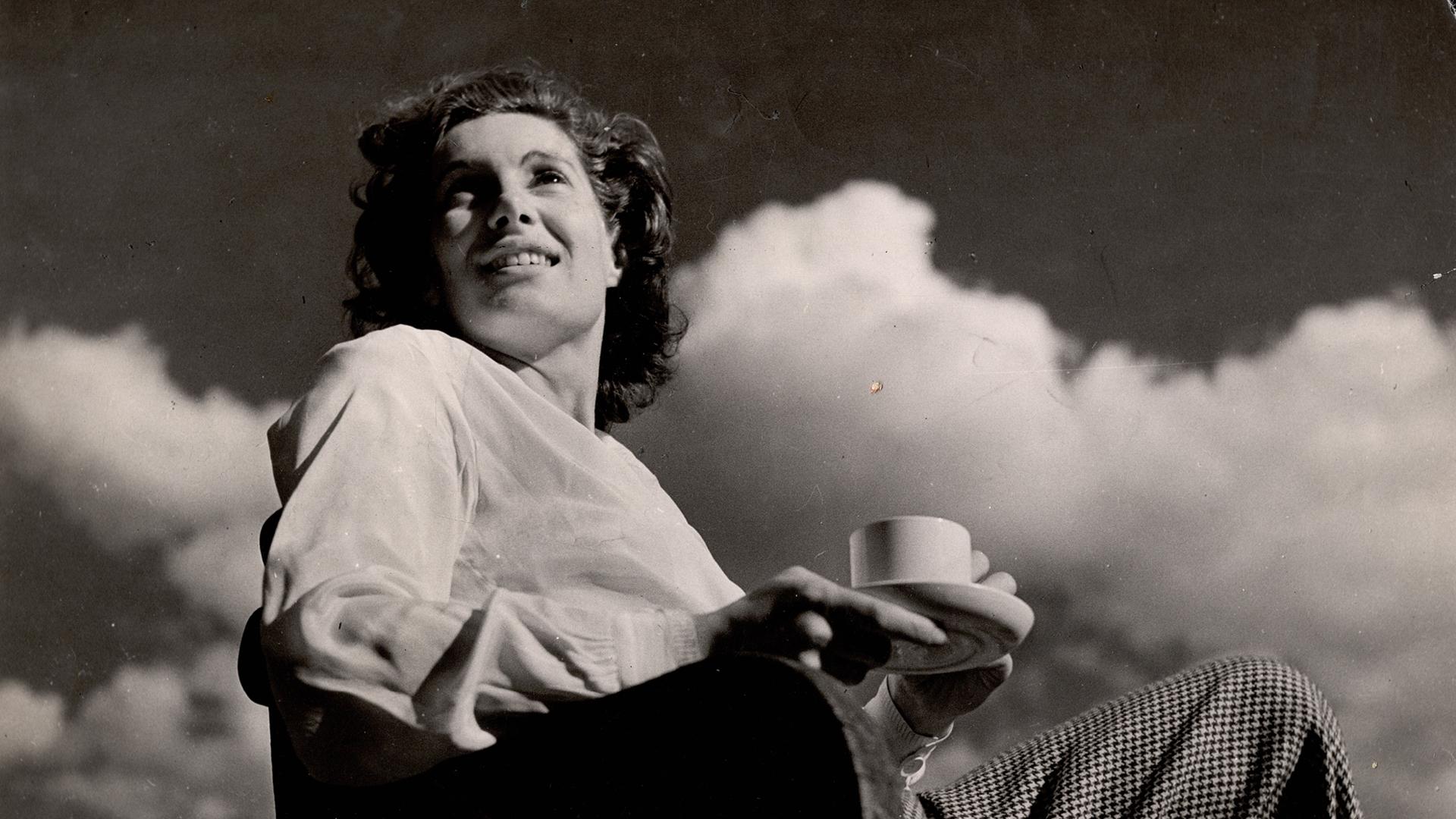
• Independent Miss Craigie, streaming 3-16 December
• Live online Q&A, 6:30-7:30pm, 7 December
Support our partner venues by selecting your cinema of choice at checkout. Tickets £5.
The Cinema of Ideas presents Lizzie Thynne’s fascinating new film on Jill Craigie (1911-99), one of the first women to direct films in Britain. Independent Miss Craigie uses previously undiscovered letters given to Thynne as well as Craigie’s own films to reveal the filmmaker’s energetic struggles to get her films made and distributed from the early 1940s such as The Way We Live (1946) and the extraordinary polemic on equal pay To Be a Woman (1951), until her final film on the Yugoslav conflict, made in 1995 when she was 83, with her husband, former Labour leader, Michael Foot.
Chronicling Craigie’s Suffragette-inspired feminism, her ethical commitment and care for her mostly non-professional actors, and her aspirations to build a better, more equal Britain after WWII, Independent Miss Craigie is a vital appreciation of a trailblazer in women’s film history.
The production of Independent Miss Craigie was supported by The Arts and Humanities Research Council and The University of Sussex.

Video streaming notice
Please note that the video platform is not compatible with Linux based operating systems (including Chromebooks). If you need technical support please contact Eventive support. You can test your device compatibility in advance here.
More Information
After honing her writing skills on the women’s magazine, ‘Betty’s Paper’, where, alongside responding to readers’ problems, she wrote horoscopes under the titular name of ‘Professor Philastro’, Craigie’s film career began in London as a scriptwriter in the late 1930s, when she persuaded J. Arthur Rank, Britain’s biggest movie mogul to fund two films, including the landmark documentary The Way We Live in 1946 about Plymouth’s re-construction post-WWII. This film, in particular, reveals Craigie’s commitment to a participatory way of working with the people whose lives she was documenting but also to inspiring and supporting her most talented, non-professional actors to become ‘stars’, an ethical approach to filmmaking we see today in the work of Penny Woolcock and Sarah Gavron.
A chance discovery of Sylvia Pankhurst’s ‘The Suffragette Movement', whilst working as an air raid warden, sparked a life-long fascination with this key moment of women’s history, informing her lasting commitment to feminism and socialism. The handful of films she made in 1944-1951 (including Out of Chaos, The Way We Live and Blue Scar) offer a fascinating glimpse from a women’s point of view, of the aspirations to build a better, more equal Britain after WWII, inspired by the socialist beliefs Craigie shared with the reforming government elected in 1945.
Of particular note, is Craigie’s brilliantly witty and astoundingly precocious polemic on equal pay, To Be A Woman (1951), her last cinema film which found Craigie successfully persuading the Equal Pay Campaign that her proposed film would be an asset to their campaign, activating members for donations for the production. A precursor to today’s crowd-funding, this appeal was successful and the film was widely shown to advance the cause. Women teachers, who had provided the most support for the film, won equal pay in 1955.
Using Craigie’s own words in interviews accompanied by Hayley Atwell’s dexterous narration, the film unearths fascinating documents on Craigie’s film and career, including from The Women’s Library and BFI National Archives, to show how Craigie negotiated the obstacles (her producers took every opportunity to use glamourous photographs of Craigie to promote her films) and well as the opportunities to direct. An essential film that re-writes the canon of British documentary film history to include Craigie’s pioneering contribution, Thynne’s film offers a dynamic and vital account of the ways in which Craigie, as a socialist feminist, carved out a space for herself as a writer/director in the almost entirely male world of film directing, as well as her forays in the 1960s into writing for the new media of television for ITV and the BBC, including a quirky piece on the fashion of long hair for men ‘Keep Your Hair On’. It was to be another 30 years before she got to make her film final with her grandson Jason Lehel as producer, and Michael Foot as a presenter, on another topic to which she was passionately committed, the West’s failure to prevent ethnic cleansing in Yugoslavia, a history which continues to haunt Europe today.
- Year2020
- Runtime93 minutes
- LanguageEnglish
- CountryUnited Kingdom
- DirectorLizzie Thynne
- ProducerLizzie Thynne
- CastHayley Atwell, Mimi Haddon, Cornelius Clarke, Steven Connery, Paul White, Bryan Hands, Catherine Humphrys, Gareth Wildig
- CinematographerPascale Neuschäfer, Malgorzata Pronko
- EditorVera Simmonds
- Production DesignErin Green, Jessica Griffin
- ComposerJames Longcake
- Sound DesignAl Green, Nikoline Gjoertz
• Independent Miss Craigie, streaming 3-16 December
• Live online Q&A, 6:30-7:30pm, 7 December
Support our partner venues by selecting your cinema of choice at checkout. Tickets £5.
The Cinema of Ideas presents Lizzie Thynne’s fascinating new film on Jill Craigie (1911-99), one of the first women to direct films in Britain. Independent Miss Craigie uses previously undiscovered letters given to Thynne as well as Craigie’s own films to reveal the filmmaker’s energetic struggles to get her films made and distributed from the early 1940s such as The Way We Live (1946) and the extraordinary polemic on equal pay To Be a Woman (1951), until her final film on the Yugoslav conflict, made in 1995 when she was 83, with her husband, former Labour leader, Michael Foot.
Chronicling Craigie’s Suffragette-inspired feminism, her ethical commitment and care for her mostly non-professional actors, and her aspirations to build a better, more equal Britain after WWII, Independent Miss Craigie is a vital appreciation of a trailblazer in women’s film history.
The production of Independent Miss Craigie was supported by The Arts and Humanities Research Council and The University of Sussex.

Video streaming notice
Please note that the video platform is not compatible with Linux based operating systems (including Chromebooks). If you need technical support please contact Eventive support. You can test your device compatibility in advance here.
More Information
After honing her writing skills on the women’s magazine, ‘Betty’s Paper’, where, alongside responding to readers’ problems, she wrote horoscopes under the titular name of ‘Professor Philastro’, Craigie’s film career began in London as a scriptwriter in the late 1930s, when she persuaded J. Arthur Rank, Britain’s biggest movie mogul to fund two films, including the landmark documentary The Way We Live in 1946 about Plymouth’s re-construction post-WWII. This film, in particular, reveals Craigie’s commitment to a participatory way of working with the people whose lives she was documenting but also to inspiring and supporting her most talented, non-professional actors to become ‘stars’, an ethical approach to filmmaking we see today in the work of Penny Woolcock and Sarah Gavron.
A chance discovery of Sylvia Pankhurst’s ‘The Suffragette Movement', whilst working as an air raid warden, sparked a life-long fascination with this key moment of women’s history, informing her lasting commitment to feminism and socialism. The handful of films she made in 1944-1951 (including Out of Chaos, The Way We Live and Blue Scar) offer a fascinating glimpse from a women’s point of view, of the aspirations to build a better, more equal Britain after WWII, inspired by the socialist beliefs Craigie shared with the reforming government elected in 1945.
Of particular note, is Craigie’s brilliantly witty and astoundingly precocious polemic on equal pay, To Be A Woman (1951), her last cinema film which found Craigie successfully persuading the Equal Pay Campaign that her proposed film would be an asset to their campaign, activating members for donations for the production. A precursor to today’s crowd-funding, this appeal was successful and the film was widely shown to advance the cause. Women teachers, who had provided the most support for the film, won equal pay in 1955.
Using Craigie’s own words in interviews accompanied by Hayley Atwell’s dexterous narration, the film unearths fascinating documents on Craigie’s film and career, including from The Women’s Library and BFI National Archives, to show how Craigie negotiated the obstacles (her producers took every opportunity to use glamourous photographs of Craigie to promote her films) and well as the opportunities to direct. An essential film that re-writes the canon of British documentary film history to include Craigie’s pioneering contribution, Thynne’s film offers a dynamic and vital account of the ways in which Craigie, as a socialist feminist, carved out a space for herself as a writer/director in the almost entirely male world of film directing, as well as her forays in the 1960s into writing for the new media of television for ITV and the BBC, including a quirky piece on the fashion of long hair for men ‘Keep Your Hair On’. It was to be another 30 years before she got to make her film final with her grandson Jason Lehel as producer, and Michael Foot as a presenter, on another topic to which she was passionately committed, the West’s failure to prevent ethnic cleansing in Yugoslavia, a history which continues to haunt Europe today.
- Year2020
- Runtime93 minutes
- LanguageEnglish
- CountryUnited Kingdom
- DirectorLizzie Thynne
- ProducerLizzie Thynne
- CastHayley Atwell, Mimi Haddon, Cornelius Clarke, Steven Connery, Paul White, Bryan Hands, Catherine Humphrys, Gareth Wildig
- CinematographerPascale Neuschäfer, Malgorzata Pronko
- EditorVera Simmonds
- Production DesignErin Green, Jessica Griffin
- ComposerJames Longcake
- Sound DesignAl Green, Nikoline Gjoertz
